Over 30 years of anarchist writing from Ireland listed under hundreds of topics
Intersectionality
Is intersectionality just another form of Identity Politics
Intersectionality has been critiqued in both the mainstream media and on the Left as nothing more than a sophisticated version of identity politics, which is seen to undermine class struggle. We have considered these critiques and sought to clarify for ourselves whether we think that ‘intersectional feminism’ is still a useful term. As we will argue below, we think that it is incorrect to elide intersectionality with identity politics. In fact, when intersectionality theory was first formulated by Black feminists it was specifically intended to be both a critique of and an alternative to identity politics. What we continue to debate, however, is whether the term has now acquired a new set of meanings from those with which it was originally imbued, and therefore if it can be ‘reclaimed’.
Intersectionality - A Basic Primer
The WSM’s politics are fundamentally intersectional. ‘Intersectionality’ is a fancy word for some rather basic ideas. You can think of it as ‘overlap-ism’ instead. There are three main points, 1) that each person needs to be seen as a whole, 2) that no power system exists in isolation, and 3) that all forms of oppression and exploitation should be uprooted at the same time.
The first point refers to the fact that real people aren’t cartoons. We are each complicated and multi-dimensional. For instance, a person is not just ‘working class’. They also have a gender. In general, life for a working class woman will be significantly different than for a working class man, not only because a woman is oppressed by sexism but because class itself is experienced differently.
Bodily Autonomy at the Intersections - audio from #DABF
The audio recording of the Bodily Autonomy at the Intersections panel at the 11th Dublin Anarchist bookfair.
Abortions rights are just one part of the struggle for full ( reproductive ) freedom
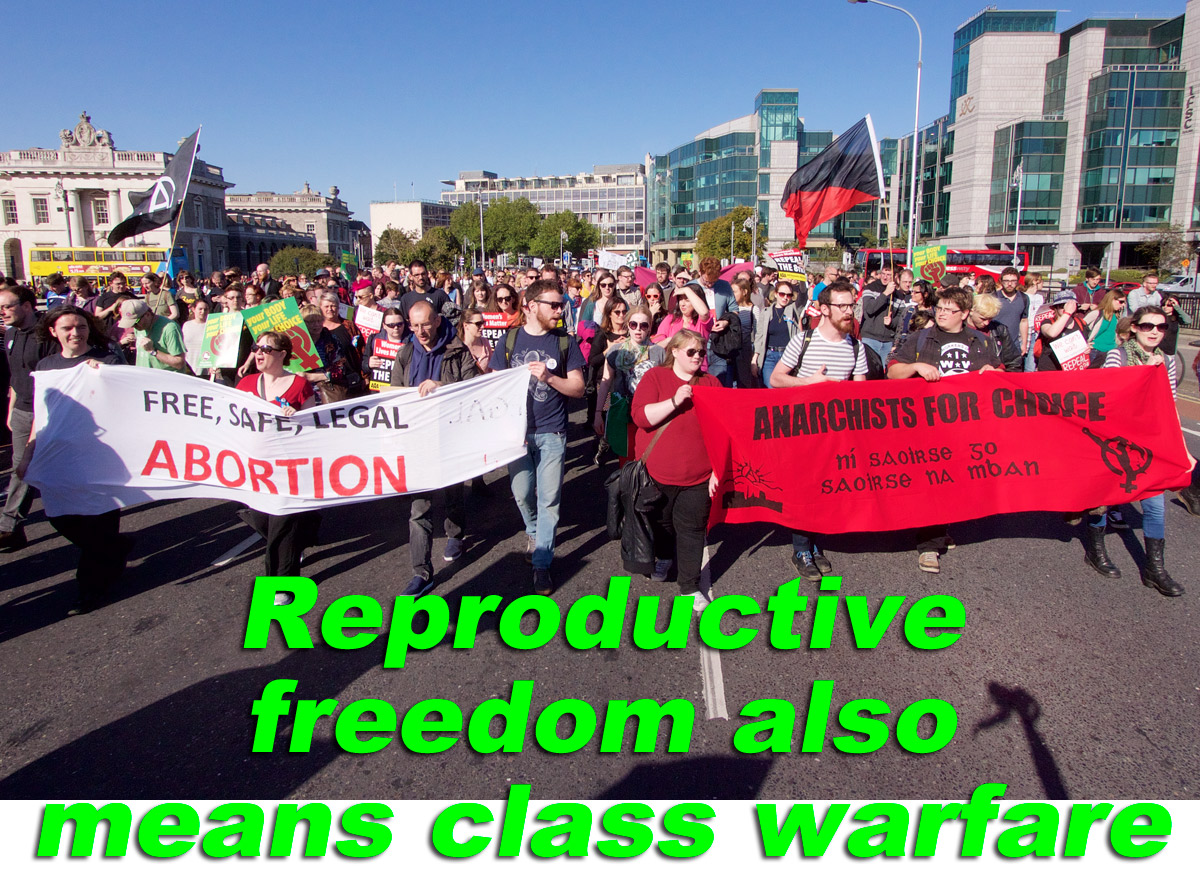 The demand for abortion rights is a shallow one if all that it means is a right to a safe and legal abortion. The demand for abortion rights must be brought into the greater battle for full reproductive freedom.
The demand for abortion rights is a shallow one if all that it means is a right to a safe and legal abortion. The demand for abortion rights must be brought into the greater battle for full reproductive freedom.
Reproductive freedom means that if someone is pregnant and does not wish to be they are supported, financially and emotionally in that decision. Likewise, if someone wishes to have a child they should not be constrained by, for example, financial issues.
Radical writings on Intersectionality, privilege, identity and difference
This is a list of radical writings around the issues of intersectionality, privilege (theory), identity (politics), and difference.
Insurrections at the intersections: feminism, intersectionality and anarchism
A critique of liberal conceptions of 'intersectionality' and an outline of an anarchist, class struggle approach.
We need to understand the body not as bound to the private or to the self—the western idea of the autonomous individual—but as being linked integrally to material expressions of community and public space. In this sense there is no neat divide between the corporeal and the social; there is instead what has been called a “social flesh.” - Wendy Harcourt and Arturo Escobar1
The Nostalgic Left
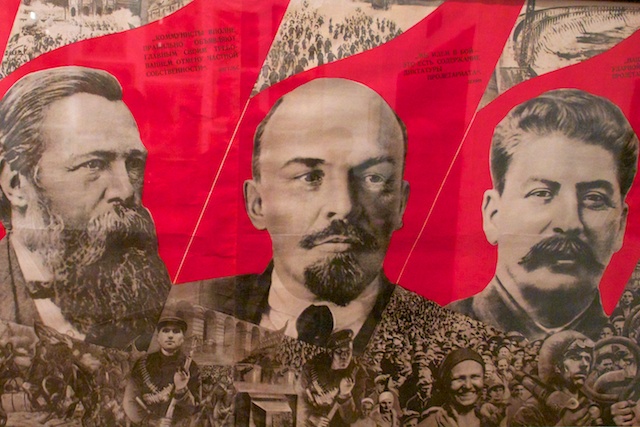
The nostalgic left is a bit of shorthand I’ve started using for those on the left who have reacted to the disintegration of the old left by wishing for idealised simpler times. And perhaps more strangely blaming the collapse on what they see as threatening new developments, like intersectionality. They hold such newfangled nonsense responsible for the current failure of the left to get an echo from the general population.
Creating an Anarchist Theory of Privilege
Privilege and the theory around it is a significant topic of debate at the moment among those interested in radical social change. Touching on many issues dear to the hearts of anarchists, it is hard to avoid.(i) Yet, the two are not fitting together as well as they should and there is a sense of unease about this. (ii) Much of this is because privilege theory has emerged from US academic circles rather than anarchist ones and, ironically, has been co-opted to protect middle- class privileges. (iii) This is a situation in need of repair if we are to maintain our links with feminist, anti- racist and other struggles against oppression. If we are to create a mass movement capable of social change then it has to be able to engage with everyone in the first place.
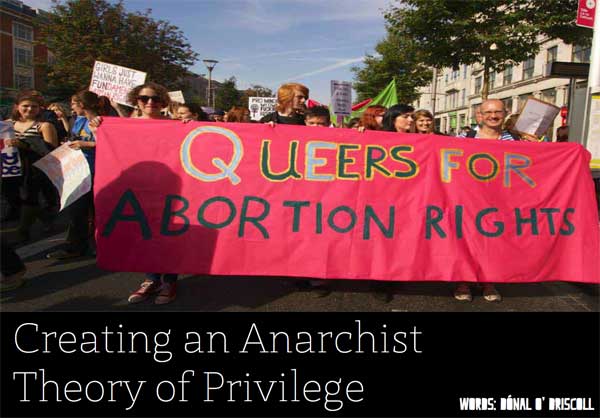
Guest writer, Dónal O’Driscoll, contributes to the ongoing discussion on intersectionality and privilege theory.
Inclusive, intersectional, anti-racist feminist class war - Many shades, second sex
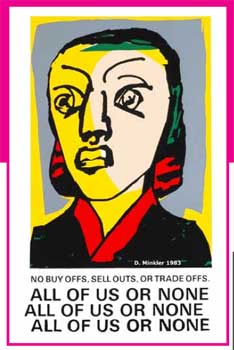 I was recently in the National Maternity Hospital on Holles Street for an appointment with a gynaecologist. The doctor requested I get some blood work done, and so I was placed in a chair outside an intake room. After waiting a few minutes, three people emerged from the room, two in medical uniforms and another in religious clothing.
I was recently in the National Maternity Hospital on Holles Street for an appointment with a gynaecologist. The doctor requested I get some blood work done, and so I was placed in a chair outside an intake room. After waiting a few minutes, three people emerged from the room, two in medical uniforms and another in religious clothing.
After the one in religious clothing had left the hall area, the two in medical uniforms looked at each other in shock. One of them then says to the other,
“Well I never. . .”
The other cuts across her, “Me neither. Where was she from?”
“Iran. Wow.”
Towards an anarchist anti-racism
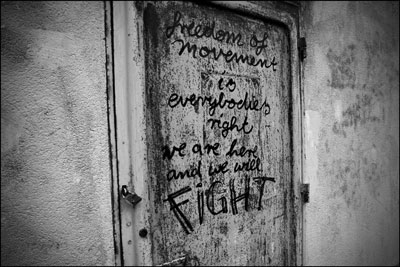 While there is a tradition of grassroots campaigning against racism in Ireland, there is less discussion of what it means to be an anti-racist from an anarchist perspective. Most material focuses on obvious forms such as hate-speech or supporting Travellers & migrants in practical terms. The issue this article seeks to raise, is that in order to get it right we also need to look at ourselves on a personal level, recognise privilege and develop a wider critique that is truer to our own politics. As such I am writing as a white anarchist, to other white anarchists.
While there is a tradition of grassroots campaigning against racism in Ireland, there is less discussion of what it means to be an anti-racist from an anarchist perspective. Most material focuses on obvious forms such as hate-speech or supporting Travellers & migrants in practical terms. The issue this article seeks to raise, is that in order to get it right we also need to look at ourselves on a personal level, recognise privilege and develop a wider critique that is truer to our own politics. As such I am writing as a white anarchist, to other white anarchists.

